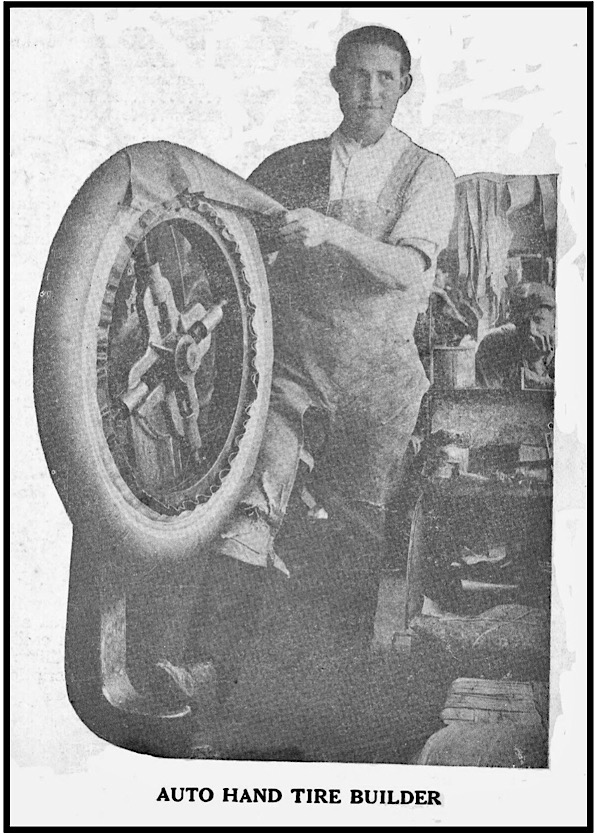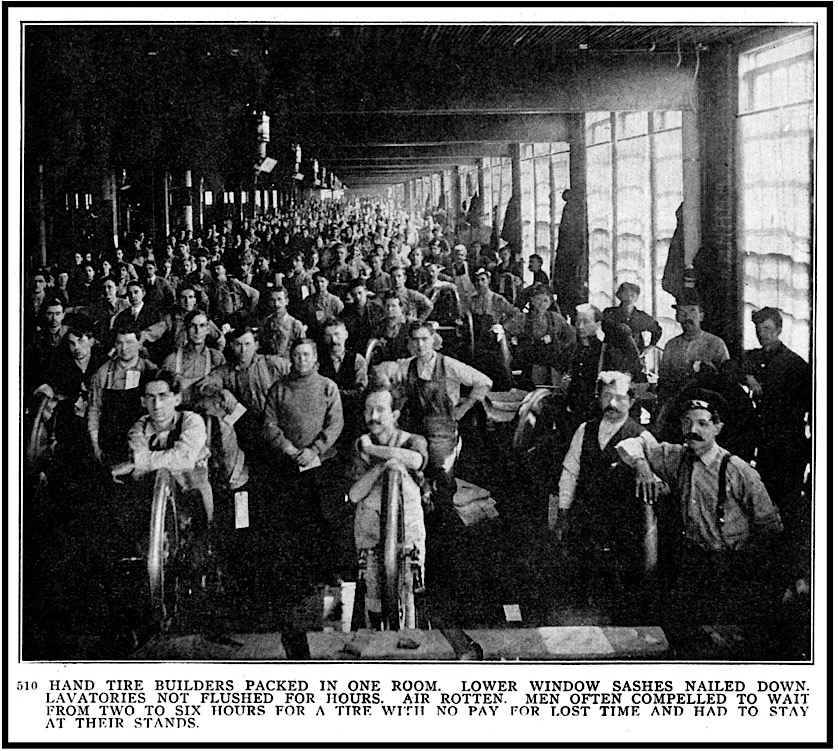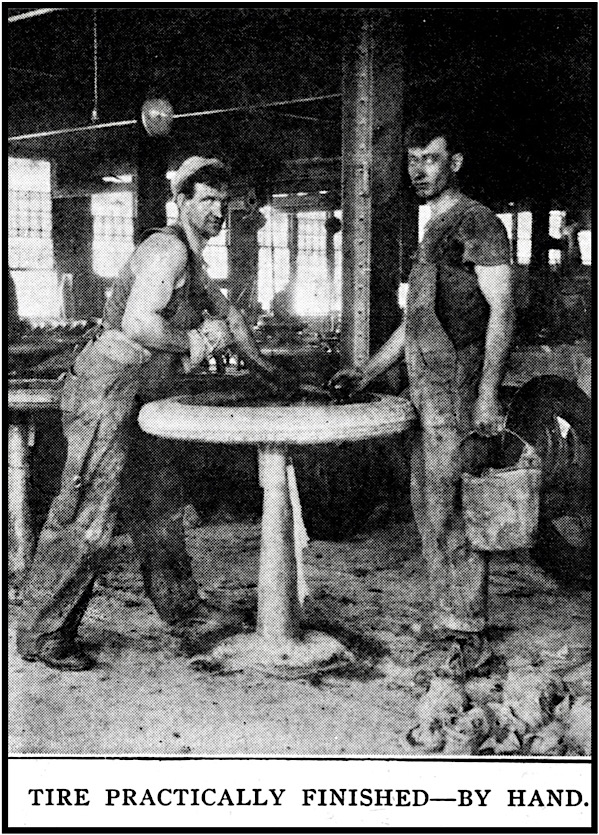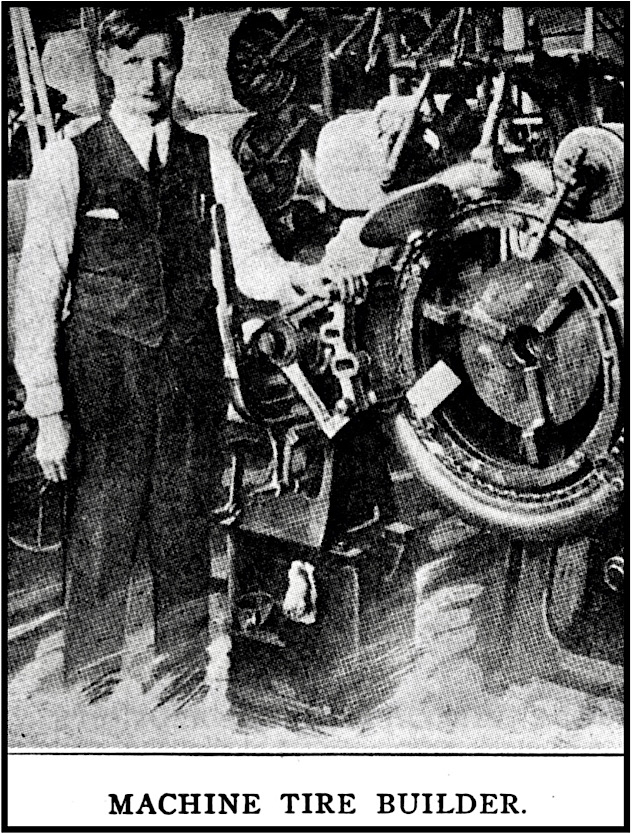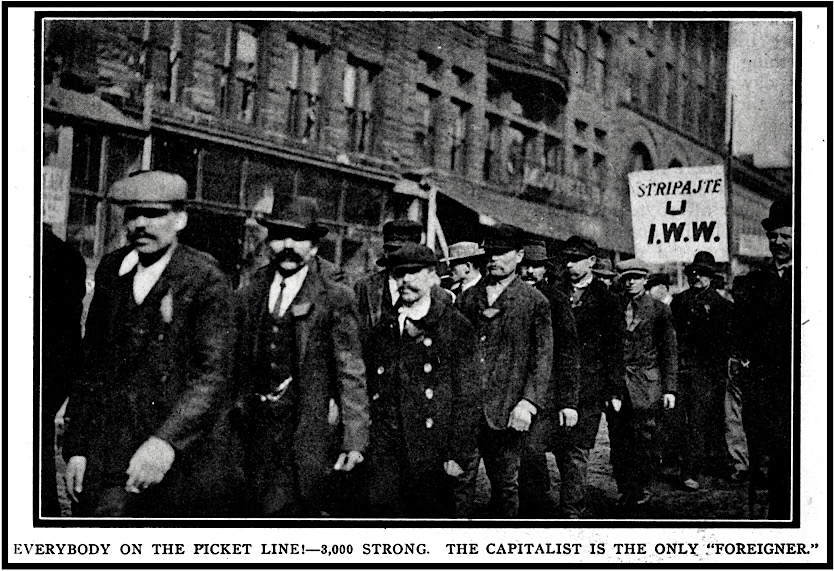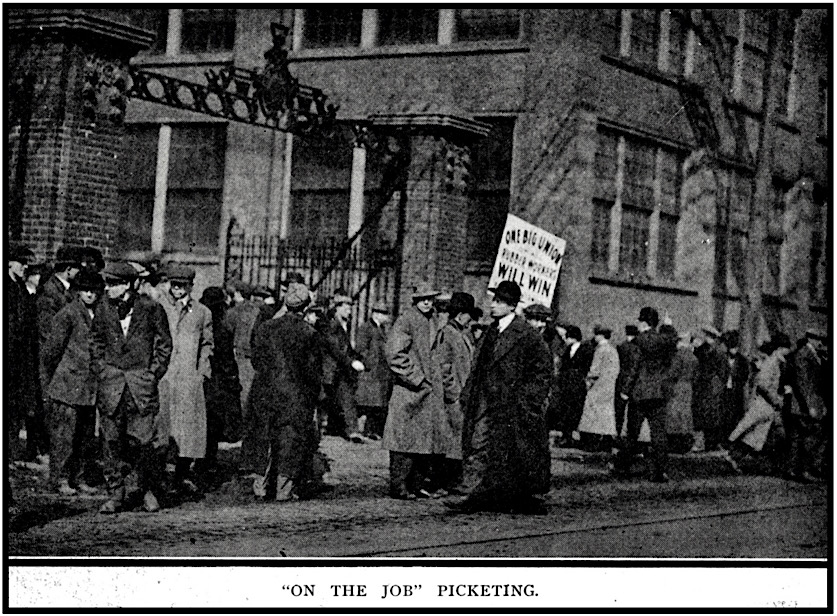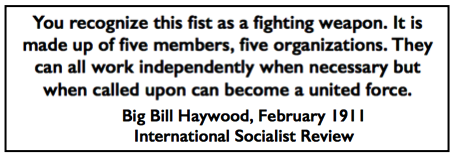 —————-
—————-
Hellraisers Journal – Thursday April 17, 1913
Akron, Ohio – The Speeding-Up System and the Akron Rubber Strike
From the International Socialist Review of April 1913:
800 Per Cent and the Akron Strike
By Leslie H. Marcy
[Part II of IV]
One of the strikers informs us that very recently the Speeding-Up System has forced the tire builders to produce 2,000 more than the regular output of tires in a single night. The same man reported that while it formerly took three hours to “cure” a tire, the time had been cut to 55 minutes in one plant. And that the “curing process” depends altogether upon the quantity of rubber used in the compound.
Five hundred to six hundred pounds of compound are made up at a time. In the good old days THREE POUNDS of actual pure rubber was used in a batch; much less is used now. A gum plant is one of the ingredients, also old rope, rags, alkali and shoddy (old rubber, such as worn-out tubing, worn-out rubbers, etc.). Although the price of pure rubber is lower than it was a few years ago, the rubber companies have cut down the quantity used steadily. Formerly tire curers earned $5.00 for curing five tires. They are now forced to cure 50 tires for the same sum. And there is NO LET UP IN THE SPEEDING UP SYSTEM. And the pay per worker goes steadily down.
The same is true of the girls in the hot-water bag and rubber goods departments. Everything is piece work. The companies offer premiums for the girl (or man) who produces the most bags, tires, or whatever it may be, and when the utmost limit has been reached, the maximum number becomes the basis for piece work .pay. An old experienced operator may be able to glue together 40 hot-water bags in a ten-hour day, working at top speed for a cash premium. But she cannot possibly keep up this pace. But the day’s wage, for such work is based upon this record pace. Girls are compelled to get to work at 7:00 a. m. in order to cement hot-water bags and then are compelled to wait for hours at a time for them to be pressed and trimmed. The girls are paid 5½ cents for making a $2.00 hot-water bag.
The girls making rubber shoes (rubbers) have been paid only 15 cents per 100 pair of tops. For every rubber that was imperfectly trimmed they were docked 5 cents. Three slips would force them to make 100 pairs of tops for nothing, while the companies sold the imperfect pairs at a good profit. We saw many time checks showing that girls had received as low as 45 cents a day. The reports of the rubber companies of their salary or wages lists are very misleading because they include the high-salaried officials who refuse to make known how much money they draw.
Many of the workers work in a poisonous compound wearing rubber gloves. Whenever a glove “springs a leak” they are burned to the bone. A “nurse” treats these burns and the worker returns to the job.
The following letter from one of the strikers printed by the Akron Press, is a telling picture of life in the factories:
I am a worker in the Goodrich “pit” and the reason I do not go before the probe committee is because I feel like a great many others that I would become too prominent.
I feel that what Mr. Pollock has told the probe committee is merely a circumstance to what we have to suffer in the Goodrich “pit.” We work thirteen hours on the night shift and eleven hours on the day shift, with no noon hour to rest and eat.
We are allowed to eat any time between 10 a. m. and 2 p. m. if the work permits. If the work comes out so that we are not able to eat our lunch during those hours, we are not permitted to finish the meal at any time during the rest of the day. If we are caught eating we are liable to be discharged, even though we may be idle at the time. We would not be eating on the company’s time for we work piece work.
The cores upon which the tires are built are solid iron and a great many are so heavy they are all one man can lift. The cores are so hot that the men are compelled to wear two pairs of canvas gloves, one over the other in order to handle them at all.
Some men have been there two years; some have to be changed because they are worn out in eight months. Some come down, look at the men and say, “I don’t want that job” and leave.
During the night shift when the men get a few minutes to sit down, you will see their heads nod and they will fall asleep, utterly exhausted and unable to keep awake.
I have seen men stand at their tables dazed for the want of sleep. I have seen these men walk over to the water cooler and hold their head under the faucet and let water run on their heads so as to revive them and I was one of them. One night I saw a “stripper” walk over to the night foreman and asked to be “fired.” The foreman told the man that he knew just how he felt, and advised him to go back and try and stick it out until morning.
In conclusion I wish to say that thirteen hours is too long for that kind of work, or any kind of work, for that matter. We are too tired to even get out of bed at all during the day; it wears a man down; he has very little time to spend with his family and his life is a cheerless, endless struggle.
A WORKER.
It is hardly necessary to inform the readers of the REVIEW that the piratical rubber kings have always vigorously opposed any organization of the workers.
Eight years ago the American Federation of Labor organized 500 men. Shortly after, the union headquarters were broken into one night and the books, containing the names of the union men, secured. Mysterious as it may sound, the fact remains that EVERY SINGLE-MAN who had joined the union lost his job.
Another unpleasant story is told of an A. F. of L. organizer who went to Akron three years ago, organized 1,500 men, whom he registered in his little book by numbers instead of names. This, he assured them, would prevent the companies from knowing who was who. He collected $1,500, and went away and that was the last of Mr. Organizer and the $1,500.
But the Akron rubber workers have learned much by experience. As soon as the A. F. of L. learned that there was a strike and the I. W. W. boys were on the job, eight organizers were rushed into Akron. They promised the strikers a $30,000 Weekly strike benefit if they would join the A. F. of L. But being stung once was enough in Akron, and the strikers have stuck to the I. W. W. The Akron Central Labor Council of the A. F . of L. has backed up the strikers and the I. W. W. from the beginning. They are out to help their brothers and sisters WIN no matter what organization they are in.
The real cause of the strike probably originated in the $2,000,000 contract submitted by the Ford Automobile Co. to the tire manufacturers of Akron. We believe the Goodyear, the Buckeye, the Firestone and Goodrich-Diamond Companies all bid for the big job. Soon there arose a violent cutting of wages. Strikers say the Firestone Company declared a 35 per cent cut. The grade of tires was considerably reduced according to strikers, also.
The first walk-out occurred in the Firestone plant which had secured a part of the Melon contract. Soon there were 18,000 men and women out. As tire contracts are not made subject to labor difficulties, it is probable that unless the Akron companies speedily yield to the demands of the strikers the Ford contract will go elsewhere.
[Emphasis added.]
~~~~~~~~~~~~~~~~~~~~~~~~~
SOURCES & IMAGES
Quote BBH One Fist, ISR p458, Feb 1911
https://play.google.com/books/reader?id=8-05AQAAMAAJ&printsec=frontcover&pg=GBS.PA458
International Socialist Review
(Chicago, Illinois)
-Apr 1913, pages Cover, 714-719
https://www.marxists.org/history/usa/pubs/isr/v13n10-apr-1913-ISR-riaz-ocr.pdf
See also:
American Rubber Workers & Organized Labor, 1900-1941
-by Daniel Nelson
Princeton University Press, Jul 14, 2014
(search: with last names mentioned above)
https://books.google.com/books?id=LAMABAAAQBAJ
James P. Cannon and the Origins of the American Revolutionary Left, 1890-1928
-by Bryan D. Palmer
University of Illinois Press, Oct 1, 2010
(search: with names mentioned above)
https://books.google.com/books?id=3m_97zuy6_MC
Tag: Akron Rubber Workers Strike of 1913
https://weneverforget.org/tag/akron-rubber-workers-strike-of-1913/
~~~~~~~~~~~~~~~~~~~~~~~~~
What We Want – John McCutcheon
Lyrics by Joe Hill

